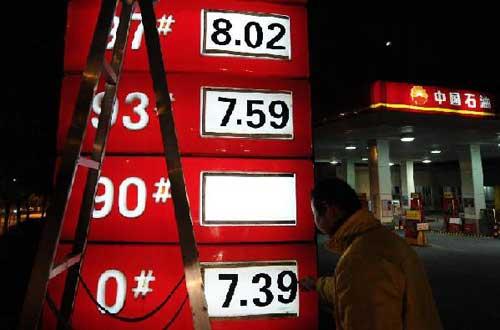China will raise the retail prices for gasoline and diesel by 300 yuan (47.53 U.S. dollars) per tonne starting Feb. 8, in a swift response to international trends as easing domestic inflation gives way for adjustment.
 A staff member of a gas
station replaces the gasoline price tag in the Jiangbei District of Chongqing, southwest China, Feb. 8, 2012. China raised
the retail prices for gasoline and diesel by 300 yuan (47.53 U.S. dollars) per
tonne on Feb. 8, in a swift response to international trends as easing domestic
inflation gives way for adjustment. The benchmark retail price of gasoline has
be lifted by 0.22 yuan per liter and diesel by 0.26 yuan per liter, according
to the National Development and Reform Commission. (Xinhua/Li Jian)
A staff member of a gas
station replaces the gasoline price tag in the Jiangbei District of Chongqing, southwest China, Feb. 8, 2012. China raised
the retail prices for gasoline and diesel by 300 yuan (47.53 U.S. dollars) per
tonne on Feb. 8, in a swift response to international trends as easing domestic
inflation gives way for adjustment. The benchmark retail price of gasoline has
be lifted by 0.22 yuan per liter and diesel by 0.26 yuan per liter, according
to the National Development and Reform Commission. (Xinhua/Li Jian)
The benchmark retail price of gasoline will be lifted by 0.22 yuan per liter and diesel by 0.26 yuan per liter, according to the National Development and Reform Commission (NDRC).
The latest price change, which was much anticipated by the market, comes amid rising pressures for the country's refineries as the increasing international crude oil futures prices keep driving up their operation costs.
With the easing European debt crisis and intensifying conflicts in the oil-rich Middle East, fuel prices on the international market have been climbing this year.
On Jan. 4, the West Texas Intermediate (WTI) futures prices rose to 103.22 U.S. dollars per barrel, an increase of 37 percent from the lowest point in last October.
The prices of international crude had jumped beyond a 4-percent range within 22 consecutive working days on Feb. 2, triggering widespread speculation that the NDRC would take action to up prices.
But the NDRC delayed the adjustment to Feb. 7, right after the much-celebrated Lantern Festival, which fell on Feb. 6.
The move follows the previous change on October 8 last year, when the NDRC announced the first price cut in 16 months, taking the fuel prices off from record highs.
China's current oil pricing system was introduced in May 2009. The system gives the NDRC the right to adjust domestic fuel, diesel and gas prices when average prices for Brent, Cinta, and Dubai crude oil move by 4 percent within 22 consecutive working days.
PRICE GAP HITS REFINERIES
Last year, the NDRC, fearing price rises would fan up the already runaway inflation, acted cautiously in price changes, choosing to take mild steps at the expense of domestic refineries' dwindling profits.
In 2011, international oil prices witnessed significant rises, with the average prices for crude oil of WTI and Brent up 20 percent and 38 percent year-on-year, respectively.
Under the current mechanism, China's gasoline and diesel prices should be correspondingly lifted by 20 percent, to around 1,500 yuan per tonne.
But considering the soaring inflation of 2011, the NDRC only raised the gasoline and diesel prices by 550 yuan and 450 yuan for the whole year, or 6.4 percent and 5.8 percent, respectively.
The country's consumer price index (CPI), a main gauge of inflation, rose 5.4 percent in 2011 from the previous year, well above the government's full-year control target of 4 percent.
The price gap piled pressure on the country's refineries, forcing them to digest the consequences through internal adjustments.
"The lagging behind of the price adjustment will lead to huge losses for oil producers and affect the sound development in the sector," an official with the NDRC said.
Now as inflation is showing signs of easing, with the December CPI slowing to a 15-month low of 4.1 percent, the NDRC moved quickly to announce the first rise in 2012.
"The price rise will help motivate the oil refineries, ensure supply in the domestic market, guide rational consumptions and promote emission cuts," the official said.
CALLING FOR A NEW MECHANISM
Since China's previous price change last October, there has been widespread speculation that the NDRC would introduce a new mechanism that would better reflect market demand and supply.
"Within the current framework, we will shorten the adjustment period, accelerate the changes, improve the pricing mechanism, and adjust the targeted crude categories," the NDRC has said in a statement on its website.
Asked about the detailed plan for the reform, the NDRC official said on Tuesday that the proposal is still in the middle of discussion and will be made public to solicit opinion after a consensus is reached.
VietNamNet/Xinhuanet


























